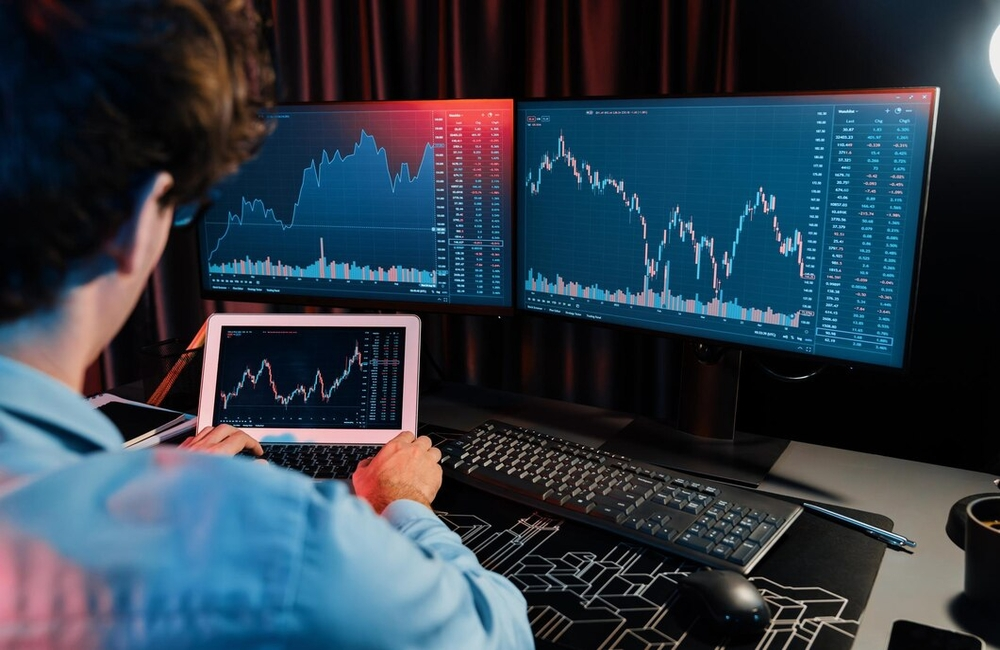ASX futures were 47 points or 0.6% higher at 7581 at 8:00 am Wednesday, implying a positive start to the trading day.
The S&P 500 gained 1.6% overnight. The Dow Jones industrial average rose 1.5%. The technology-focused Nasdaq Composite added 2.2%. It was the best day for all three indexes in a month. The advances were widespread, with 10 of the S&P 500’s 11 sectors climbing. The only one to fall in the wake of oil prices was the energy group, the best performing sector this year.
US first quarter earnings season is well and truly upon us and early indications are that earnings growth remains resilient in the face of climbing inflation and skyrocketing energy prices. Of the 48 companies that have reported, 79% have posted positive surprises, according to Bloomberg.
“Any indication that we’re witnessing corporate America find its way through that environment and still grow profits is a very, very positive driver of equities going forward through the balance of the year,” said Craig Fehr, investment strategist at Edward Jones.
Streaming behemoth Netflix plunged 25% in after-market trading after announcing its first loss of subscribers in a decade. It anticipates more losses in the next quarter.
The bond market rout accelerated overnight when comments from Fed officials added to expectations of fierce rate hikes. Chicago Fed president Charles Evan said rates could range between 2.25 and 2.5% by the end of the year, and may need to go higher if inflation persists. St Louis Fed president James Bullard raised the possibility of a 0.75 percent hike, the first of its size since 1994.
Bonds of all stripes sold off. US 10 Year Treasury note to 2.94% and the 2 Year to 2.59%.
On Tuesday, the International Monetary Fund slashed its 2022 forecast for global growth by 0.8 percentage points, to 3.6 percent, citing Russia’s invasion of Ukraine.
The S&P/ASX 200 course locally added 0.6% to 7565.2 Tuesday as large-cap firms gained.
The benchmark index rebounded from a four-day holiday weekend, ignoring a weak lead from United States equities, which ended down modestly, to register its second straight advance.
The heavyweight financials and materials sectors both racked up solid gains after minutes from the RBA’s April board meeting were broadly interpreted as bolstering market expectations that the central bank will raise interest rates in June.
The big banks, Commonwealth Bank, Westpac, ANZ and NAB also gained between 0.5 and 1.2 percent.
Private equity giant KKR has bid for Ramsay Healthcare, Australia’s biggest private hospital operator, at $88 per share, valuing it at over $20 billion. The bid represents a 37% premium to Ramsay’s last closing price of $64.39.
Miners Fortescue, BHP and Rio Tinto were up 0.6% to 1.3%.
We see the top movers for commodity markets: Losses for iron ore at $US 149 (-2.6%); 85 per tonne; gold futures dropped 1.4% to US$ 1,959.00; Brent crude oil fell 4.9% to US$ 107.59.
Locally the Australian 10 Year bond yield soared back above 3% to 3.06% after minutes from a Reserve Bank meeting in March were interpreted as supporting market expectations for a rate hike in June.
The Australian dollar was fetching 73.75 US cents at 7:00 am, after the previous close of 73.46. The WSJ Dollar Index, which gauges the US dollar against 16 others, edged up to 93.42.
Asia
Chinese shares fell in the last session of the day as the market was pressured by increasing fears of an economic slowdown in 2Q, following yesterday's weak trading. Benchmark Shanghai Composite Index edged down 1.49 points to 3194.03, while the Shenzhen Composite Index was 0.1% lower at 2020.28. The tech-heavy ChiNext Price Index saw the largest decline, dropping 1.4% to 2453.55.
The downside was led by consumer goods companies like makers of cosmetics, sellers of home appliances and furniture firms. Chip makers and electronics suppliers also dragged down the sector, which was weaker after gains on Monday.
Hong Kong stocks tumbled sharply upon returning from a long holiday weekend, with the benchmark Hang Seng Index giving up 2.3% to finish at 21027.76.
In a research note, KGI Securities points out that weakness is linked to the recent tepid A share results, soft 1Q China economic data despite better-than-expected GDP growth + rising US Treasury yields that tend to siphon funding from Asian equities. There were heavy losses on the index for China Merchants Bank which dropped 11% after the bank’s board voted to fire its president.
Sportswear makers Li Ning and Anta slid 7.3% and 5.2%, respectively, after the latter reported disappointing 1Q sales data. Tech companies also dragged on the market, with Alibaba Health off 6.0% and Meituan shedding 5.9%.
Japanese markets close up led by electronics and auto stocks; USD/JPY hits a new 20-year high. Lasertec advances 5.3% and Nissan Motor rises 3.9%. The Nikkei Stock Average climbs 0.7% to 26985.09.
USD/JPY is at 128.19 after earlier climbing to 128.23, its highest since May 2002, versus 126.99 as of Monday 5 p.m. New York Time. As the earnings season is due to kick off later this week, investors are still focused on movements in the yen.
Europe
European equities lost ground in closing trade due to an increasing number of calls for the EU to impose an energy embargo on Russian supplies in response to its invasion of Ukraine.
The pan-European Stoxx Europe 600 fell 0.8%, the FTSE 100 slid 0.2%, the German DAX declined 0.1% and the French CAC 40 lost 0.8%.
Concerns about the economic impact of a potential EU embargo on Russian energy have weighed on European equities, IG analyst Chris Beauchamp says in a note.
“Although the calls to terminate Russian supplies are understandable, it raises the already non-negligible probability of recession for the near horizon, further diminishing Europe’s already pale attractiveness.”
London’s FTSE 100 index fell 0.2%, or 12 points to 7603 as caution prevails following mixed trading in Asia and a weaker close on Wall Street Monday.
“US trading, which had been fractious throughout the day, had little to show for itself, with the major indices coming to rest fractionally lower on a familiar set of influences,” Richard Hunter at Interactive Investor says.
“With first-quarter earnings season now picking up pace, investors are still watching closely for the impact of the Omicron variant, the Russia-Ukraine conflict and soaring inflation on global growth.”
A wide swathe of stocks decline, with Polymetal International, Reckitt Benckiser, Carnival and Diageo leading the way lower, but oil, mining and financial stocks rise and offset overall losses.
North America
US stocks and government bond yields rose Tuesday as investors sifted through the latest round of earnings reports for signs that corporate profits remain buoyant despite inflation.
Despite rising costs, analysts expect profits for major US companies to continue to increase this year. That has spurred the bull case for equities at a time when investors are worried about the Federal Reserve’s intentions to raise interest rates to combat inflation.
The S&P 500 advanced 1.6%. The Dow Jones industrial average climbed 1.5%. The tech-heavy Nasdaq Composite climbed 2.2%. It was the best day for all three indexes in a month.
The gains were widespread, with 10 of the 11 sectors in the S&P 500 rising. Only the energy group, the best-performing sector this year, fell.
“That is the evidence that companies are providing that they can generate the kind of earnings growth you need to look past this tightening in monetary policy that investors are concerned about,” said Craig Fehr, an investment strategist at Edward Jones.
“Any evidence that we are seeing corporate America be able to work their way through that environment and still be able to grow their profits is a very, very positive driver for equities for the balance of the year,” he said.
With boosted stocks in the travel industry among the day’s strongest performers, a federal judge had overturned a requirement that any travelers in the United States wear masks aboard airplanes and other forms of mass transit.
Shares of American Airlines Group gained $1.05, or 5.7%, to $19.59. Shares of Las Vegas Sands rose $1.59, or 4.3%, to $38.24. Shares of Carnival gained 87 cents, or 4.6%, to $19.91.
The market is in the middle of earnings season with dozens of large US companies set to report this week. With inflation running high, investors are looking for clues on which companies can maintain their profits by passing along higher costs to customers in the form of price increases.
Johnson & Johnson climbed $5.42, or 3.1%, to $183.08 after the pharmaceutical company reported earnings that topped expectations. Travelers dipped $9.06, or 4.9%, to $176.16 even after reporting stronger earnings and raising its dividend.
Netflix shares plunged 23 percent in after-hours trading after the streaming giant reported that it lost subscribers worldwide in the first quarter and also expects to do so this spring.
The yield on the 10-year US Treasury note continued to rise in bond markets. The yield on the benchmark bond climbed to 2.911%, its highest settle since December 2018, from 2.861% on Monday.
Bond yields increase as prices fall, and investors have been selling bonds out of expectations for high inflation and interest-rate increases from the Federal Reserve.
“Fixed income has been especially painful. This is the worst bear market in bonds we’ve had in a generation,” said Brian O’Reilly, head of market strategy at Mediolanum International Funds.
Worries about inflation which has climbed to multi-decade highs and to what extent central banks will respond have consumed investors’ thoughts for months, but so far, corporate profits have held up as companies have largely been able to pass higher costs through to consumers. Investors say they are looking for earnings growth to moderate this quarter, as it grows more difficult for companies to keep raising prices.
“The longer prices remain high, the longer this war in Ukraine goes on, the greater the chance something has to give. Corporations cannot indefinitely continue to pass input costs forward,” Mr. O’Reilly said. “There has to be a tipping point.”
Other stock movers included shares of American Campus Communities, which surged $7.22, or 13 percent, to $64.80 after The Wall Street Journal reported that Blackstone is acquiring the student-housing owner in a deal worth $12.8 billion.
Plug Power shares gained $2.50, or 9.8 percent, to $28.05 after the alternative-energy company said it had reached a deal to provide hydrogen to Walmart, the retailer.
In commodity markets, the international oil benchmark, Brent crude, was down 5.2 percent, to $107.25 a barrel. Natural gas slumped 8.2%, extending a period of whipsawing for the fuel. Gold prices declined 1.4%.
























